#the forbidden fruit (apple) of knowledge...
Explore tagged Tumblr posts
Text

Adam and Eve (1507), (detail), by Albrecht Dürer (1471–1528) , oil on wood panel, 208 x 91 cm, Museo del Prado, Madrid
#adam and eve#eve#albrecht dürer#albrecht durer#painting#detail#oil on wood panel#museo del prado#madrid#german art#german renaissance#northern renaissance#16th century#art#fine art#bible#biblical#the garden of eden#genesis#serpent#temptation#the tree of knowledge#the apple#sin#forbidden fruit#oil on wood#renaissance#gothic#albertus durer alemanus faciebat post virginis partum#my upload
59 notes
·
View notes
Text
if you contextualise it right you could make an absolutely horrific moment out of 12's line in 9x1 "it's the wicked stepmother! everyone hiss!"
#dont think it fits in the video im currently making but like. oof#OOF#thinking of the master blaming the doctor the doctor blaming the master for something tecteun/rassilon did to them#im thinking of portrait of a lady on fire 'imagine me happy or imagine me miserable with the situation but dont think im GUILTY'#shes a virus hes diseased patient zero it's all lies none of this is the truth they HID it from us it was painted over with prettierpicture#13s like mother like daughter moments the confusion of victim and perpetrator and so the foundling became the founder#EVERYONE HISS!!!!!#snake ouroboros vicious cycle#erased memories#it's the wicked stepmother everyone hiss#the apple the snake the knowledge the forbidden fruit you regret eating#blame her! take him! swap our places! swap our places! take my memories! give them back!
12 notes
·
View notes
Text
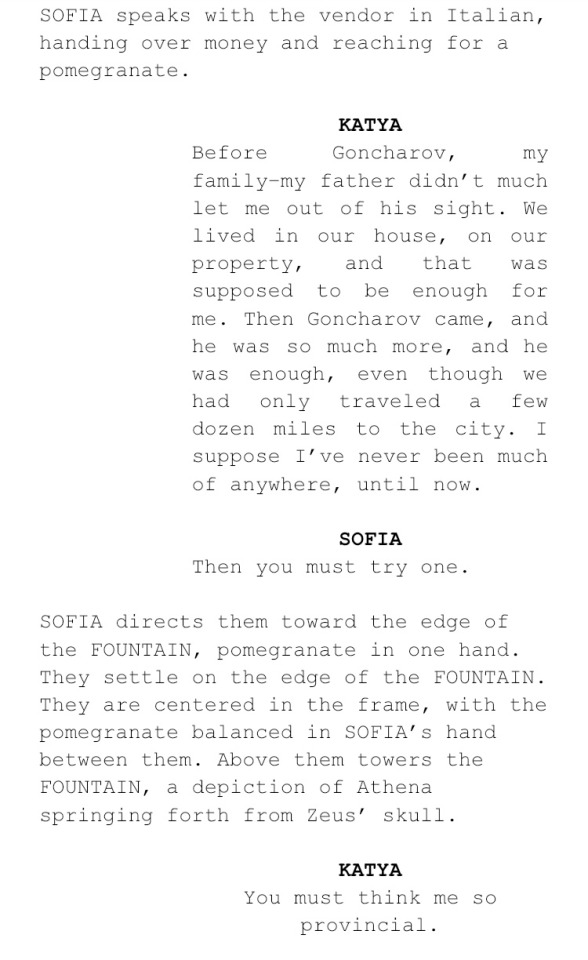
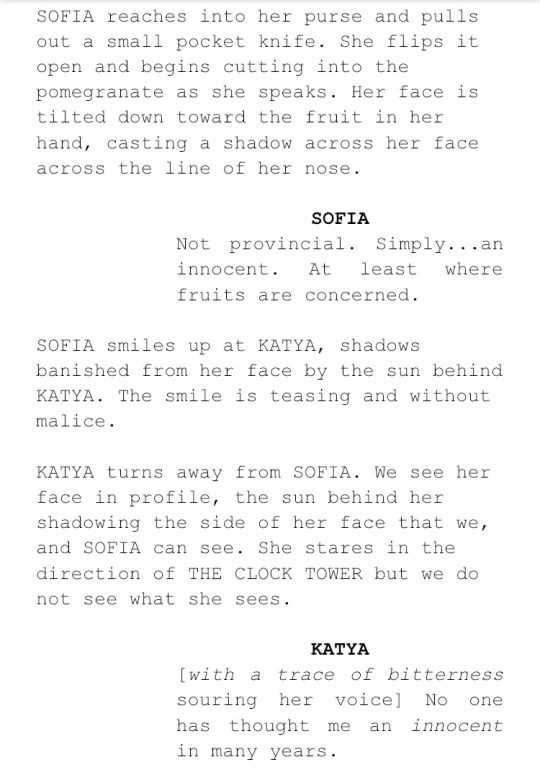
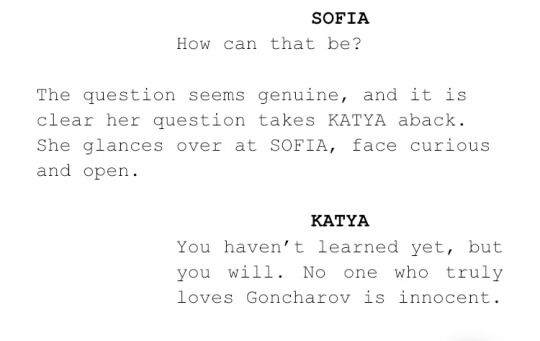
I know objectively the next part of the scene, where Sofia teaches Katya how to each a pomegranate and tells her about the mythology of Persephone and Hades and the pomegranate juice stains Katya’s suit is the more iconic part, and for good reason, but like, especially considering how feral we’ve all gotten about the resurgence of this movie this past week, I couldn’t help but dig up an old copy of the script to emphasize that last line, which I feel like we’ve definitely been skipping over in our discourse.
#goncharov#goncharov 1973#katya x sophia#katya goncharov#the fruit vendor scene#i first watched this movie in middle school during my greek mythology phase#and let me tell you this scene had me unhinged#like#the story of persephone and hades which is canonically a rape and a loss of innocence#but here sofia is giving katya all the information she needs to make informed consent#and then also with athena looming behind them which evokes the idea of knowledge#or at least wisdom#which in and of itself evokes goncharov and andrey’s apple scene#which is also about forbidden knowledge but handled so differently#(okay but am I too late to the party?)#(did I do it did I goncharov?)
18 notes
·
View notes
Text
Eve with the Fruit of Knowledge

#eve with the fruit of knowledge#eve#tree of knowledge#cat#funny#lol#cat with apple#apple#photoshop#photo edit#edited photos#edited picture#bible reference#religion joke#forbidden fruit#:3
25K notes
·
View notes
Text
thought too hard about rhine being a hi3 expy. brain hurt
#guuys#if she was a mobius expy#and alice was eris#then i could make a#garden of eden refeerennce analogy#the forbidden fruit (apple) of knowledge...#guys....#sedate#me#!!!!!!!!!!!!!!!!!!!!!!!!!!!!!!!!!!!!!!#i love youu lesbians!!!#id write a fic based off this but im but a lazy#lazy#person#LMAOOAOA#alice.. forbidden knowledge.. rhine#rhinealice forbidden knowledge...#soosooosoooooo many thoughts......#rhinealice#rhine hcs
1 note
·
View note
Text
It's so funny when men make such a big deal out of "not being sheep". Eve ate the apple. God, the ruler, told her not to do it. He was in power and commanded both her and Adam to obey him and not eat the forbidden fruit. Eve went against him. Eve, a woman, was the one to say "I'm not going to follow what you tell me. I'm going to make my own path. I want knowledge outside of the knowledge you have dictated I must have." Adam, a man, was more than happy to lay down and let a man in power tell him what to do. Men are the original sheep.
790 notes
·
View notes
Text
I'm too tired to gather my thoughts cohesively on this but.
The Anakt Garden bears a lot of resemblance to the Garden of Eden, right? The landscape is an ideal nature paradise and the humans kept within it are expected to live in blissful ignorance and obedience. It's not far-fetched to say that a lot of religious inspiration was taken when making the Anakt Garden considering the prevalence of "gods" and worship in the series. What's more, there is apparently a whole subject in the Anakt Garden dedicated to religion.
Through this Garden it's almost as if the aliens are attempting to recreate or rewrite the genesis of mankind now that they have established themselves as beings of power. The aliens tend to "play god", creating artificial humans and modifying existing ones in order to suit their needs.
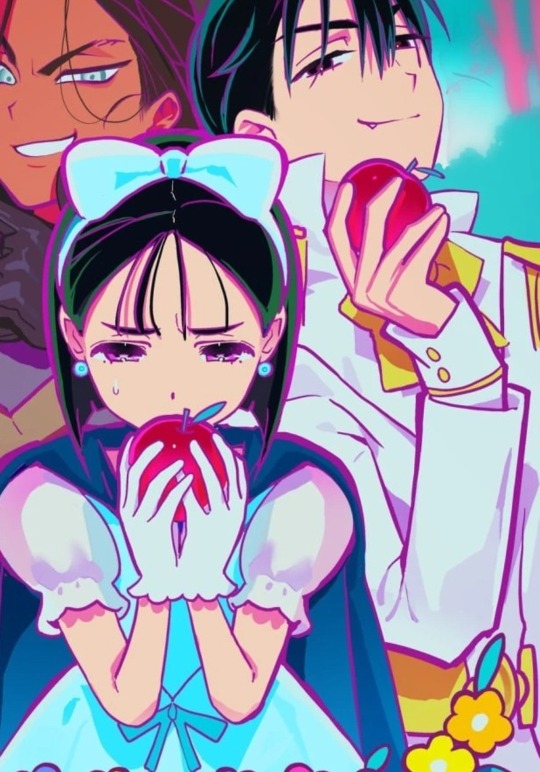
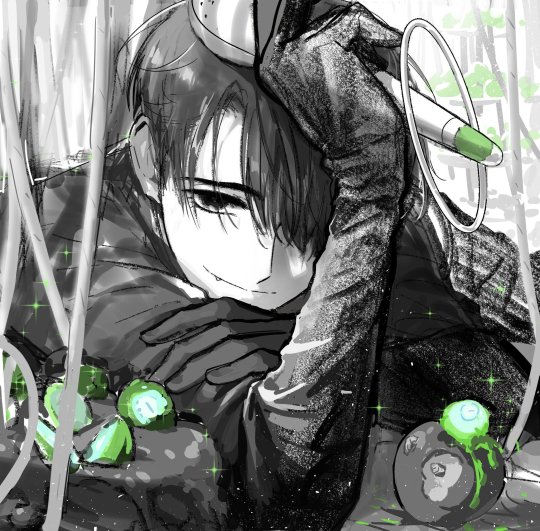
In past official arts, Sua and Ivan (two top students of Anakt Garden who know more about the truth of the system than they let on) have been depicted with apples. The same fruit that symbolizes disobedience and forbidden knowledge.
#alnst#alien stage#alien stage ivan#alien stage sua#i think a lot about how mizi lived blissfully ignorant of suffering and the truth#while sua who knew the true extent of alien cruelty simply lived alongside mizi and kept her knowledge secret in order to maintain a facade#i think about all the knowledge ivan has at his disposal. how hes able to do things and access places hes not supposed to#they're both completely aware of what had to happen and offered themselves in order to save their beloved from that fate#the curse of knowledge#its hilarious how im drawing these conclusions from completely unrelated official arts just HEAR ME OUT#para.musing
254 notes
·
View notes
Text
Hazbin establishes very strong parallels between Charlie and Vaggie’s relationship and Lucifer and Lilith’s.
Charlie being as to Lucifer, the fantastical dreamer discouraged and rejected by the world around them.
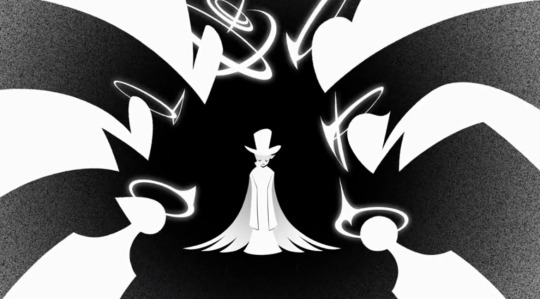
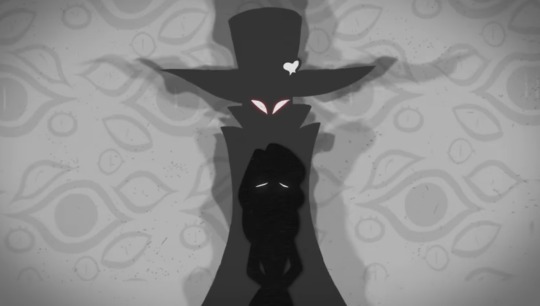
Vaggie being as to Lilith, someone who failed their assigned role and were driven out of ‘paradise’ (Heaven/Eden) by someone they should have been able to trust (Lute/Adam).
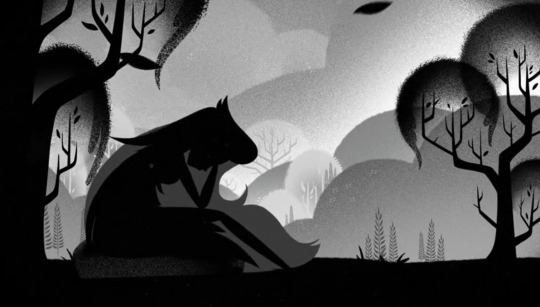
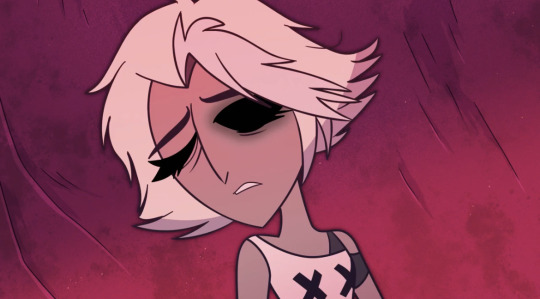
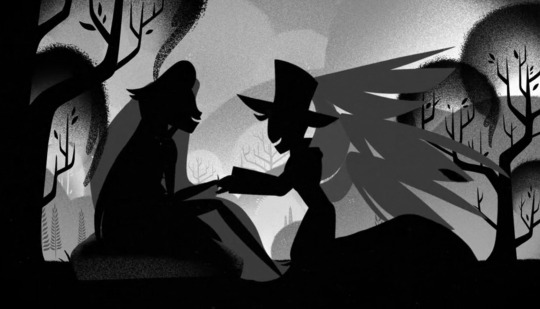
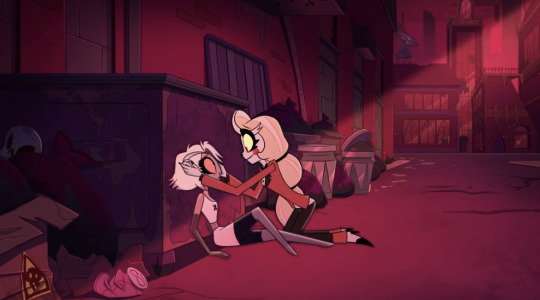
In their most vulnerable moments Lucifer and Charlie find them, love blossoming between each pair because they defied the norm, Lucifer and Lilith being rebellious in a world of order and Charlie and Vaggie being kind in a world of cruelty.
Though at the same time, Charlie is to Lilith while Vaggie is to Lucifer.
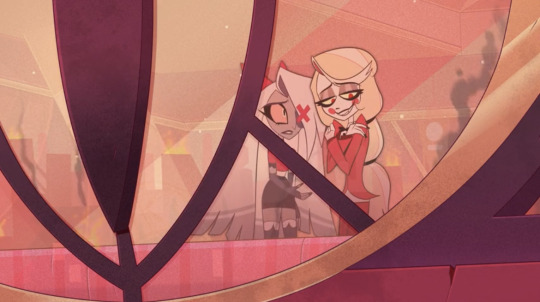
“This kingdom was something she really cared about. Something I care about.”
Charlie acknowledges she is the last thread of the hope her mother gave to Hell all those thousands of years ago. The responsibility to her home Charlie puts on her shoulders is born from the love Lilith had for it. She is directly following in her mother’s footsteps, truly believing her people deserve better and that they’re worth fighting for.
Then there is their partners, the fallen angels who don’t share their love’s connection to Hell. Lucifer saw sinners as horrible people who wasted the gift he went to Hell for giving them. Vaggie always kept everyone not named Charlie a spear’s distance away, treating them as people she tolerated but never trusted for a moment. Despite what Heaven had done, had done to them, they were still thinking like angels.
(Though, these mentalities would change throughout the first season, Lucifer choosing to support Charlie no matter what and Vaggie accepting the hotel crew as a part of the in-group which she wishes to protect)
Lucifer’s distaste for his people, not fighting alongside Lilith’s rebellion and instead agreeing to the exterminations, seems to be why they eventually split, despite the love they held for each other. In extreme contrast, Vaggie always supporting Charlie is what keeps them together despite bumps in their relationship. Vaggie always chose to believe in and support Charlie and that means the world and more to Charlie, who spent so much of her life unsupported.
The show also juxtaposes Lucifer’s parental love for Charlie with Vaggie’s romantic love for her, most prominently with Vaggie starting the reprise of More Than Anything to express her love as Lucifer did originally.
(They’re also just. Charlie and Lilith being these tall powerful demon women with Vaggie and Lucifer being their short and tiny fallen angel loves)
What becomes interesting is during the finale when Lucifer (very strongly, very tastefully) implies he ate out Adam’s first wife before fucking his second.
This seems to based on sexual interpretations of original sin. However, in Hazbin we are very much lead to believe the Fruit of Knowledge is a literal apple. Given that Lilith is said to have also offered the apple to Eve, I doubt the implication is that Luci had any sort of one night stand with Eve. Rather, I think Lilith, Eve, and him were once, or attempted to be, in a romantic relationship.
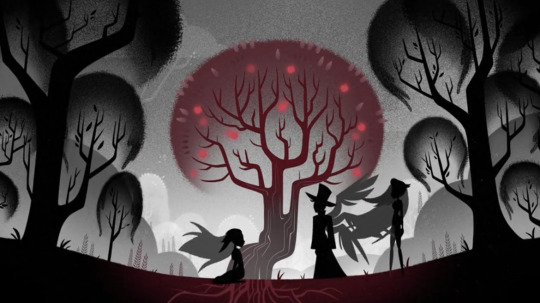
(Considering Eve was made to be Adam’s lesser and Lucifer and Lilith shared the gift of free will with her specifically, I do wonder if Eve had fallen in love with the two, but was unable to leave Adam. The Fruit of Knowledge being given to her so she would be able to be free and join their relationship, but ultimately resulted in their separation as Lucifer and Lilith were casted into Hell)
Which certainly has implications about the future of Charlie and Vaggie’s relationship.
I think the show has actually set very compelling parallels between Eve and Emily.
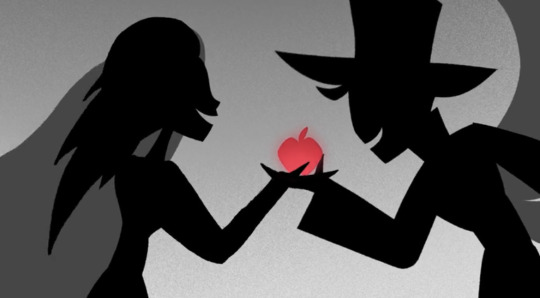
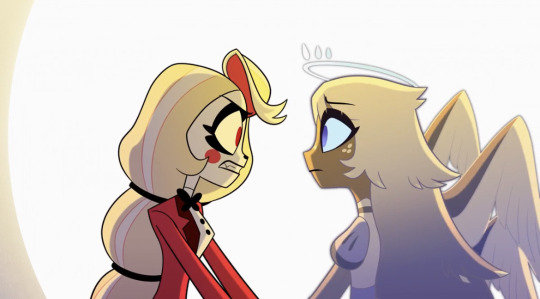
Much as Lucifer shared forbidden knowledge with Eve, it’s Charlie’s actions that revealed the hidden truth of Heaven’s exterminations. There’s the specific ‘free will’ which Eve was gifted, which fits with Charlie’s influence giving Emily the ‘free will’ to defy Sera and act against Heaven.
I’ve also talked before about the possibility Emily was brought into existence to fill Lucifer’s place in Heaven. Considering the protective relationship Sera has with Emily, along with her looks of genuine horror at her acting against Heaven, it brings to mind the idea Sera has been fearful that Emily would fall just as Lucifer did for Emily’s entire existence, and as such raised her to be more likely to never stray from Heaven as Lucifer did. Which could add to why Sera hid Heaven’s genocide from her despite Emily being a high ranking seraphim; she couldn’t risk giving Emily a reason to rebel.
Which would be a very striking analogue between the two. Both living replacements for the fallen, born into someone else’s shadow to take their place, intended to be the more docile and proper version of Lilith and Lucifer, less likely to stray from the roles they were created to fill. Though, of course, we know Eve fell to temptation and maybe-probably-definitely left or tried to leave Adam, and that Emily is walking the edge.
(Emily having ties to both Lucifer and Eve seems relevant with how Charlie and Vaggie each have parallels to Lucifer and Lilith. Perhaps in her fall, we’ll see Emily ‘thrive in Hell’ just as Lilith did, and similarities between Charlie and Vaggie to Eve will pop up the more we learn about her?)
What’s also interesting is that Eve ‘falling into temptation’ (choosing Lucifer and Lilith over her preordained role) is what separated her from them. However, if Emily were to choose supporting Charlie’s dream over her place in Heaven, then her falling would be what brought her to Charlie and Vaggie. Thereby their situation acts as a foil to the previous generation’s.
And Emily supporting Charlie is very relevant. In More Than Anything we get the exchange of:
“I’ll support your dream whatever lies in store.”
“And who could ask for more?”
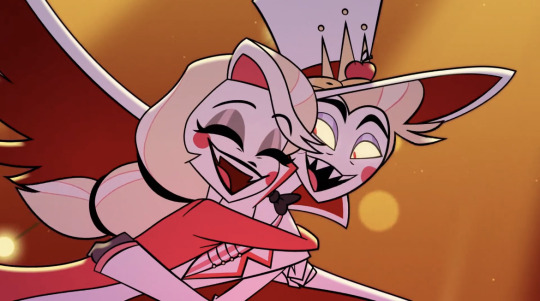
Because Charlie can’t think of anything more she could ask. Charlie’s idea of love and being loved is so heavily based on support and being supported. It’s a part of the conflict in Hell’s Greatest Dad, that Lucifer is being genuine and Alastor manipulative, but Alastor is the one actually providing Charlie with what she asks of him, which Lucifer never has. Charlie shows her love for Hell by believing in them, that they can improve, they deserve safety, and they have worth. It’s why Vaggie’s love is so important to Charlie, because for a long time, she was the only one believing in her.
And what does Emily do?
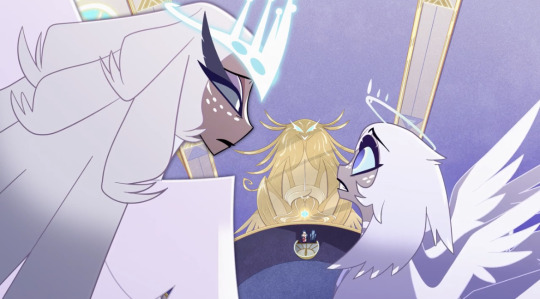
“I don’t know-”
“Yeah, let’s give him a chance!”
She supports Charlie! She believes and trusts her and argues on her behalf. She’s the only angel in Heaven to have faith in Charlie’s dream. Having Emily in the position of a fallen angel, falling right into Charlie’s arms, Charlie caring for her and nursing her back to health, with her being someone who very deeply believes in her, would be the same conditions that made Charlie fall in love with Vaggie three years ago.
Then for Vaggie, Emily also has a lot of the textbook traits that she loves Charlie for. The overexcited-ness, the care she has for others, even the way she doesn’t pull rank. And what she hasn’t expressed, that being seeing value in Vaggie where she herself does not, it feels natural that Emily would express that in the way Charlie does upon learning Vaggie’s history. We’ve seen her sense of justice and her horror at Heaven’s actions, so her deeply sympathizing with Vaggie would be entirely expected, and would be a very easy way for Vaggie to catch feelings for Emily.
However, there is this:
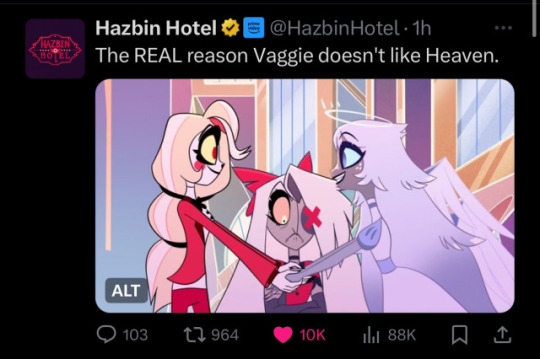
Which suggests the direction of a jealous Vaggie. I think that works, at least initially, with Vaggie feeling insecure in her relationship with Charlie after Emily falling and being cared for by Charlie in the way she was all that time ago. Those feelings heavily changing however, at the realization that Emily is crushing on her just as much as she is Charlie and how deeply relatable to her Emily’s circumstances and trauma would be.
Then on Emily’s side, not only would she have very much been thinking and focusing on Charlie prior to her fall, once she does, she lands in a very emotionally volatile situation where Charlie and Vaggie are supporting her so much and caring for her so deeply. It makes sense that this would translate to her developing feelings for the both of them.
(Now, this is a bit less definitive, but with Emily’s design, the long hair and dress that covers every inch of her short of her fingers, and Heaven being a stand in for the imperialist church, I do read the coming-of-age story the show has set up for her to be one of a conservative christian raised girl striking out of the doctrine she grew up in and finding community in the people her home had demonized, or at least an allegory for such. So having her develop romantic feelings for two ‘vile and blasphemous’ women in a very non-monogamous way would be very thematically relevant I think)
I would say this all works great as an analogue to Lucifer, Lilith, and Eve. Eve being in the unfortunate situation of Adam’s wife but finding comfort in Lucifer and Lilith and falling for the both of them as Emily would as a fallen angel being comforted by Charlie and Vaggie. Lucifer seeing Lilith reflected in Eve and caring for and helping her as he did before being parallel to Charlie helping Emily as she did Vaggie. Lilith initially feeling negativity towards the woman made to replace her bond so closely with her new love, only to realize Eve is falling for her just as much as she is for Lucifer and empathizing with Eve’s situation so deeply, just like Vaggie.
Then, there’s Adam and Lute. I already mentioned that they play parallel with forcing Lilith and Vaggie out of their respective paradises. Their dynamics are built on Adam and Lute punishing, and their domination over, Lilith and Vaggie, because they need to know their place: beneath them. (There’s also the interpretation of that Lute had or has romantic feelings for Vaggie, which is certainly relevant) The show is being very clear with Lute being Adam’s successor I feel, with her taking on his position as leader of the exorcists following his death.
Then, her line: “Your brat is threatening the very foundation of Heaven.” Personally, that makes me think of a sediment Adam would feel towards Lucifer. That’s he is the source of every problem, that he stole his wives (ignoring that Lilith left him before even meeting Luci), and that he destroyed paradise, Eden. Now that Vaggie and Lute’s conflict has seemingly come to a close, I think the show will be shifting to a Lute vs Charlie conflict, much as Adam shifted from Lilith to his hatred for Lucifer.
Now, if the show wants to push a Adam-Eve dynamic with Lute and Emily, what I could imagine is Lute protecting onto Emily in a very one sided way, where she thinks Charlie has ‘corrupted’ the seraphim (threatening heaven’s foundation) and she must personally ‘save’ her, which would very much align with how Adam would feel towards Lucifer’s influence on Eve.
Now, we can tell that Lucifer, Lilith, and Eve’s relationship Did Not pan out particularly well. So I think much like how Charlie and Vaggie have succeeded where Lilith and Lucifer failed, Charlie, Vaggie, and Emily is going to be the successful foil to their attempted relationship. Then for Lute, I think it becomes a question of: does she accept the olive branch Adam did not, does she eventually understand that she is doing wrong, does she accept mercy, or does she continue down Adam’s path, digging her own grave as he did; except that unlike Adam, there won’t be anyone to cry for her?
And y’know, the angel and 3 immortal humans versus the demon/half immortal human and 3 angels serves as a nice counter.
#hazbin hotel#charlie morningstar#vaggie hazbin hotel#emily hazbin hotel#lute hazbin hotel#lucifer morningstar#lilith morningstar#eve hazbin hotel#adam hazbin hotel#chaggily#forbidden fruits#<- that’s the lucifer+lilith+eve tag yes?#lucilith#chaggie#txt
238 notes
·
View notes
Text
Paradise Lost: How John Milton's 1667 work influenced "Hazbin Hotel"
I've been thinking about why the "fruit of knowledge" in Hazbin Hotel is depicted as an apple, as opposed to another fruit that would've been more accurate to the Middle East during the Fall of Man, as well as how Paradise Lost by John Milton (1667) influenced the show.
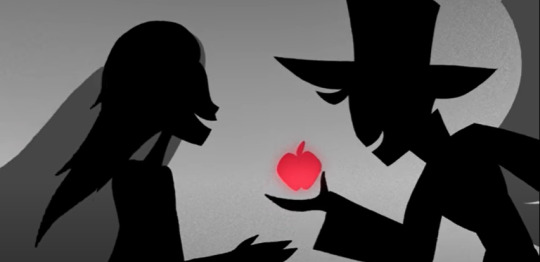
Per one source:
"Because the Hebrew Bible describes the forbidden fruit only as 'peri', the term for general fruit, no one knows [what exactly type of fruit it was]. It could be a fruit that doesn't exist anymore. Historians have speculated it may have been any one of these fruits: pomegranate, mango, fig, grapes, etrog or citron, carob, pear, quince, or mushroom."
Per Wikipedia:
"The pseudepigraphic Book of Enoch describes the tree of knowledge: 'It was like a species of the Tamarind tree, bearing fruit which resembled grapes extremely fine; and its fragrance extended to a considerable distance. I exclaimed, How beautiful is this tree, and how delightful is its appearance!' (1 Enoch 31:4)."
In Jewish and Islamic traditions, the "fruit of knowledge" is commonly identified with grapes. The Zohar explains that Noah attempted (but failed) to rectify the sin of Adam by using grape wine for holy purposes. Today, the "Noah grape" is still used to make white wine.

Furthermore:
"The association of the pomegranate with knowledge of the underworld as provided in the Ancient Greek legend of Hades and Persephone may also have given rise to an association with knowledge of the 'otherworld', tying-in with knowledge that is forbidden to mortals. It is also believed Hades offered Persephone a pomegranate to force her to stay with him in the underworld for 6 months of the year. Hades is the Greek god of the underworld, and the Bible states that whoever eats the forbidden fruit shall die."
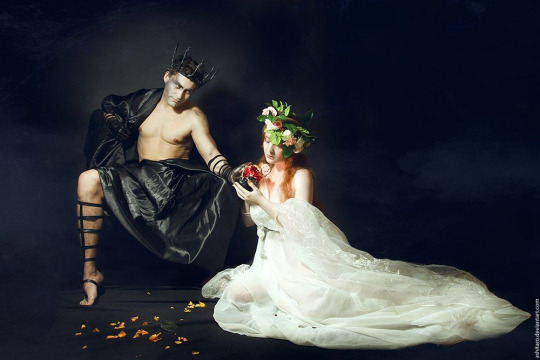
So, how then did the apple become the foremost symbol of the "fruit of knowledge"? You can partly thank Paradise Lost by English poet John Milton, a work which the lore of Hazbin Hotel is based off of.
Milton published the book in 1667, a time when the hedonistic Restoration era was in full swing. The exiled King Charles II was restored to the throne as King of England in 1660, and was a party animal, with dozens of mistresses, and nicknamed both the "playboy prince" and "Old Rowley", the latter after his favorite lustful stallion.
However, the association of the "fruit of knowledge" began with a Latin pun long before Milton immortalized the association in Paradise Lost. Per the linked article above by Nina Martyris for NPR:
"In order to explain, we have to go all the way back to the fourth century A.D., when Pope Damasus ordered his leading scholar of scripture, Jerome, to translate the Hebrew Bible into Latin. Jerome's path-breaking, 15-year project, which resulted in the canonical 'Vulgate', used the Latin spoken by the common man. As it turned out, the Latin words for evil and apple are the same: 'malus'.
[...] When Jerome was translating the 'Tree of the Knowledge of Good and Evil', the word 'malus' snaked in. A brilliant but controversial theologian, Jerome was known for his hot temper, but he obviously also had a rather cool sense of humor.
'Jerome had several options,' says Robert Appelbaum, a professor of English literature at Sweden's Uppsala University. 'But he hit upon the idea of translating 'peri' as 'malus', which in Latin has two very different meanings. As an adjective, 'malus' means 'bad' or 'evil'. As a noun it seems to mean an apple, in our own sense of the word, coming from the very common tree now known officially as the 'Malus pumila'. So Jerome came up with a very good pun.'
The story doesn't end there. 'To complicate things even more,' says Appelbaum, 'the word 'malus' in Jerome's time, and for a long time after, could refer to any fleshy seed-bearing fruit. A pear was a kind of 'malus'. So was the fig, the peach, and so forth.'
Which explains why Michelangelo's Sistine Chapel fresco features a serpent coiled around a fig tree. But the apple began to dominate Fall artworks in Europe after the German artist Albrecht Dürer's famous 1504 engraving depicted the First Couple counterpoised beside an apple tree. It became a template for future artists such as Lucas Cranach the Elder, whose luminous Adam and Eve painting is hung with apples that glow like rubies.
Milton, then, was only following cultural tradition. But he was a renowned Cambridge intellectual fluent in Latin, Greek and Hebrew, who served as secretary for foreign tongues to Oliver Cromwell during the Commonwealth. If anyone was aware of the 'malus' pun, it would be him, and yet he chose to run it with it. Why?
Appelbaum says that Milton's use of the term 'apple' was ambiguous. 'Even in Milton's time the word had two meanings: either what was our common apple, or, again, any fleshy seed-bearing fruit. Milton probably had in mind an ambiguously named object with a variety of connotations as well as denotations, most but not all of them associating the idea of the apple with a kind of innocence, though also with a kind of intoxication, since hard apple cider was a common English drink.'
It was only later readers of Milton, says Appelbaum, who thought of 'apple' as 'apple', and not any seed-bearing fruit. For them, the forbidden fruit became synonymous with the 'malus pumila'. As a widely read canonical work, 'Paradise Lost' was influential in cementing the role of apple in the Fall of Man story."
To tie this back into John Milton's relationship with King Charles II of England, as mentioned, Milton originally served Oliver Cromwell, Lord Protector of England, and the English Commonwealth, which was formed with the overthrow and execution of King Charles I on 30 January 1649, following the bloody English Civil War (1642 – 1651).
The King's two sons - the newly-christened King Charles II, the elder, and James, Duke of York (King James II), the younger - fled into exile on the European continent. However, with the death of Oliver Cromwell on 3 September 1658 came the 2-year-long dissolution of the English Commonwealth, and the restoration of the monarchy.
As for Milton himself, we can look to an article by Bill Potter.
Milton, born on 9 December 1608, was around 51-52 years old when King Charles II was restored to the throne. He attended Christ's Church, Cambridge in his youth, and mastered at least six languages, as well as history and philosophy; making him, perhaps, the most knowledgeable poet in history. He spent more than a year travelling across Europe, conversing with and learning from intellectuals, linguists, poets, and artists, including the famous Galileo Galilei.
However, Milton was a controversial figure of his time, being unafraid to criticize institutions of authority; arguing that "divorce was Biblical", for which he was routinely condemned; joining the Puritans; penning the Areopagitica, a treatise on liberty in favor of Parliament and the Roundhead rebels, during the reign of King Charles I, arguing that the King must be held accountable by the people; and agreed with and justified the murder of King Charles I, for which Parliament hired him in 1649 as a propagandist and correspondence secretary to foreign powers, on account of his fiery manifestos against "the man".
The collapse of the Commonwealth with the death of Oliver Cromwell in 1658 did not deter Milton from continued political writing against the monarchy and the new public sentiment that brought about its Restoration under King Charles II in 1660. On the contrary, Milton - now totally blind, having lost his eyesight by the age of 44 in 1652, a decade earlier - began writing Paradise Lost in 1661, and spent the next six years dictating the work to transcribers.
A supporter of regicide, Milton was also forced into exile himself, and faked his own death, as Charles refused to pardon - and sought to execute - any of those directly involved with his father's murder. Milton's friends held a mock funeral for Milton on 27 August 1660, just months after the coronation of King Charles II on 23 April 1660.
King Charles II commented that he "applauded his [Milton's] policy in escaping the punishment of death [execution for treason] by a reasonable show of dying", but insisted on a public spectacle nonetheless by having Milton's writings burned by the public hangman.
After eventually obtaining a general pardon from King Charles II, Milton was imprisoned, and released, likely due to political friends in high places. He died, aged 64, in 1674. His theological views were sometimes considered heterodox by the best Puritans, and his political views came close to getting him executed on several occasions. His poetry, however, has endured as some of the greatest works in the English language, especially Paradise Lost; much of his greatest work was written during his 22 years of complete blindness.
One of the main factors in King Charles II deciding to grant a pardon to Milton was, ironically, Paradise Lost. While originally written by Milton as a scathing criticism of King Charles II and the monarchy - depicting Lucifer Morningstar as a sympathetic rebel against God, with King Charles II claiming that is right to rule came from "divine ordainment" - Charles II enjoyed the work, and authorized its publication on 20 August 1667. We know this because a 1668 copy of Paradise Lost in royal bindings by Samuel Mearne, bound lovingly in a fine red leather made of goat skins tanned with sumac, and stamped in gold with the royal cypher of King Charles II, was found. The endpapers bore a watermark with the royal arms of Charles II.
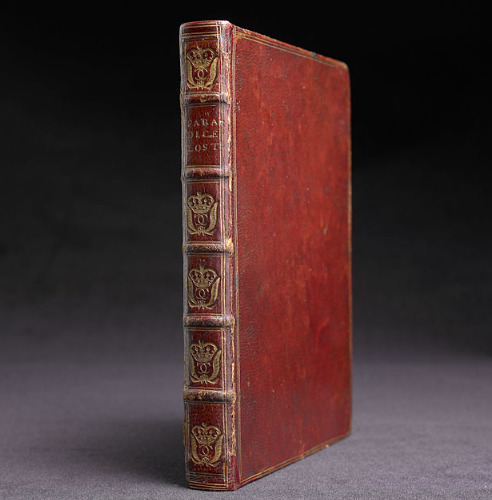
Per one Miltonian scholar: "The most single important event in Milton's life was the event against which he struggled most: the Restoration of Charles II, [and his relationship with the King]. Had it not come, we might have never had Paradise Lost...certainly, we should never have had [it] in [its] present power and significance."
Milton followed up Paradise Lost with Paradise Regained in 1671, three years before his death, with advice for King Charles II, urging the hedonistic Charles to "reign over himself and his passions":
"For therein stands the office of a King, His Honour, Vertue, Merit and chief Praise, That for the Publick all this weight he bears. Yet he who reigns within himself, and rules Passions, Desires, and Fears, is more a King; Which every wise and vertuous man attains: And who attains not, ill aspires to rule Cities of men, or head-strong Multitudes, Subject himself to Anarchy within, Or lawless passions in him which he serves." - John Milton, Paradise Regained, Book II, lines 463-472
To summarize: "If we must have a King back again, my Lord, please try to be a good man, unlike your father, who fell to his pride, [which was also the downfall of Lucifer]."
To quote another source: "Though the passage begins by noting that the office of a King is to bear the weight of public concerns, it is the control of one's private concerns that truly set a King apart as a virtuous character. Indeed, so important is self-command that any wise or virtuous man who attains it is like a king; any king who does not practice [self-command] is nothing more than a mere subject, ruled by anarchy and lawlessness."
Milton's words, too, echo a work written by Charles' grandfather, King James VI/I of Scotland and England: Basilikon Doron ("Royal Gift").
Per Wikipedia:
"'Basilikon Doron' (Βασιλικὸν Δῶρον) means 'royal gift' in Ancient Greek, and was written in the form of a private letter to James' eldest son, Henry, Duke of Rothesay (1594–1612). After Henry's death, James gave it to his second son, Charles, born 1600, later King Charles I. Seven copies were printed in Edinburgh in 1599, and it was republished in London in 1603, when it sold in the thousands.
This document is separated into three books, serving as general guidelines to follow to be an efficient monarch. The first describes a king's duty towards God as a Christian. The second focuses on the roles and responsibilities in office. The third concerns proper behaviour in daily life.
As the first part is concerned with being a good Christian, James instructed his son to love and respect God as well as to fear Him. Furthermore, it is essential to carefully study the Scripture (the Bible) and especially specific books in both the Old and New Testaments. Lastly, he must pray often and always be thankful for what God has given him.
In the second book, James encouraged his son to be a good king, as opposed to a tyrant, by establishing and executing laws as well as governing with justice and equality, such as by boosting the economy. The final portion of the Basilikon Doron focuses on the daily life of a monarch.
All of these guidelines composed an underlying code of conduct to be followed by all monarchs and heads of state to rule and govern efficiently. James assembled these directions as a result of his own experience and upbringing. He, therefore, offered the 'Basilikon Doron' ('Royal Gift') to his son, with the hope of rendering him a capable ruler, and perhaps to pass it down to future generations.
Overall, it repeats the argument for the divine right of kings, as set out in 'The True Law of Free Monarchies', which was also written by James. It warns against 'Papists' (Roman Catholics) and derides Puritans, in keeping with his philosophy of following a 'middle path', which is also reflected in the preface to the 1611 King James Bible. It also advocates removing the Apocrypha from the Bible."
King James VI/I further instructed his son and grandson:
"A good monarch must be well acquainted with his subjects, and so it would be wise to visit each of the kingdoms every three years."
"During war or armed conflict, he should choose old-but-good captains to lead an army of young and agile soldiers."
"In the court and the household, [a royal] should carefully select loyal gentlemen and servants to surround him. When the time came to choose a wife, it would be best if she were of the same religion and had a generous estate. However, she must not meddle with governmental politics, but perform her domestic duties."
"As for inheritance, to ensure stability, the kingdom should be left to the eldest son, not divided among all children."
"Lastly, it is most important...that [a royal] would know well his own craft...to properly govern over his subjects. To do so, [one] must study the laws of the kingdom, and actively participate in the council. Furthermore, [one] must be acquainted with mathematics for military purposes, and world history for foreign policy."
"[A royal] must also not drink and sleep excessively. His wardrobe should always be clean and proper, and he must never let his hair and nails grow long. In his writing and speech, he should use honest and plain language."
King James VI/I further supplemented Basilikon Doron with a written treatise titled The True Law of Free Monarchies: Or, The Reciprocal and Mutual Duty Between a Free King and His Natural Subjects.
"It is believed King James VI/I wrote the tract to set forth his idea of absolutist monarchism in clear contrast to the contractarian views espoused by, among others, James' tutor George Buchanan (in 'De Jure Regni apud Scotos'), [which] held the idea that monarchs rule in accordance of some sort of social contract with their people. James saw the divine right of kings as an extension of the apostolic succession, as both not being subjected by humanly laws."
Milton's own Areopagitica was a follow-up on De Jure Regni apid Scotos by George Buchanan, and also to The True Law of Free Monarchies, as well as the idea of the "divine right of kings". It takes its title in part from Areopagitikos (Greek: Ἀρεοπαγιτικός), a speech written by Athenian orator Isocrates in the 4th century BC.
Most importantly, Milton also wrote on the concept of free will: "Milton's ideas were ahead of his time in the sense that he anticipated the arguments of later advocates of freedom of the press by relating the concept of free will, and choice to individual expression and right."
The concept of free will, too, was a major topic explored in Paradise Lost. Per one source: "In 'Paradise Lost', Milton argues that though God foresaw the Fall of Man, he still didn't influence Adam and Eve's free will. [...] God specifically says that he gives his creatures the option to serve or disobey, as he wants obedience that is freely given [or chosen], not forced. Some critics have claimed that the God of the poem undercuts his own arguments; however, Milton did not believe in the Calvinistic idea of 'predestination' (that God has already decided who is going to Hell and who to Heaven), but he often comes close to describing a Calvinistic God. God purposefully lets Lucifer (Satan) escape Hell, and sneak past Uriel into the Garden of Eden, and basically orchestrates the whole situation so that humanity can be easily ruined by a single disobedient act. In describing the Fall of Man before it happens, God already predicts how he will remedy it, and give greater glory to himself by sending his Son [Jesus Christ] to die, and restore the order of Heaven."
In Hazbin Hotel, Adam also describes the Calvinistic idea of 'predestination', and that "the rules are black and white":

However, "This possible predestination leads to the theory of the 'fortunate fall', which is based on Adam's delight at learning of the eventual coming of the Messiah [from his bloodline]. This idea says that God allowed the Fall of Man, so that he could bring good out of it, possibly more good than would have occurred without the Fall, and be able to show his love and power through the incarnation of his Son. In this way, the free will of Adam and Eve (and Lucifer/Satan) remains basically free, but still fits into God's overarching plan."
However, there is one major flaw with this, and that is that we don't know if Jesus Christ exists within the Hazbin Hotel universe or not. Yet Charlie Morningstar, the daughter of Lucifer Morningstar and Lilith, and the "Princess of Hell", is depicted as a savior-esque figure within the show who, like God in Paradise Lost, encourages lowly sinners to choose obedience to God out of their own free will. More interestingly, Charlie does not come from Adam's bloodline; yet, while Lucifer decries 'free will', Charlie supports 'free will' instead.
Perhaps is is merely because Charlie, being the daughter of Lucifer and Lilith, claims to want to fulfill Lilith's "dream" of humanity being empowered in Hell ("The mind is its own place, it can make Heaven out of Hell, or Hell out of Heaven" - Lucifer, Paradise Lost); however, I think it also stems from Charlie having a genuine belief that 'free will', and people choosing to do good instead of evil, is "good" and "Godly".
True to Paradise Lost, this is also in fulfillment of God's plan; and, according to one fanfiction, why God allowed Charlie to be born to Lucifer and Lilith, so that sinners may be redeemed through Charlie.
For more on differing interpretations of 'free will', I suggest reading: "Free Will and the Diminishing Importance of God's Will: A Study of Paradise Lost and Supernatural" by Kimberly Batchelor (2016)
Excerpt: "'Paradise Lost' –and Milton’s purpose for writing the poem— is rooted deeply in postreformation Arminianism and this is apparent in its employment of free will. Chapter 1 argues that Milton turns to free will as a tool to justify the actions of God. Freedom of choice is God-given, and sets up a morality in which right and wrong are dictated by God. Chapter 2 shows that in 'Supernatural', free will is not given by a higher power; and, in fact, free choice functions as an act of defiance against God's will."
This raises the question: Is 'free will' given by God, using Lucifer as his vessel, in Hazbin Hotel, as in Paradise Lost? Or is 'free will' not given by a higher power; and, in fact, an act of defiance against God?
This brings us back around to our first question: Why is an apple, or 'malus', used to depict the "fruit of knowledge", especially if 'malus' means 'bad or evil', whereas Milton depicts 'free will' as God-given?
Well, for one, Lucifer still chooses to associate himself with apple symbolism and imagery, despite being skeptical of free will:
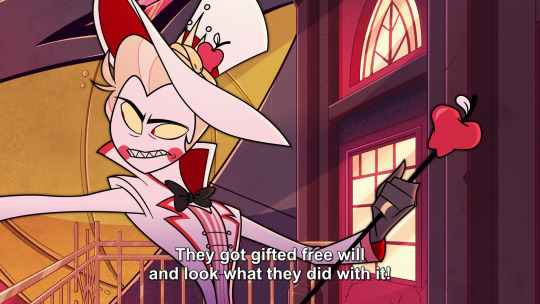
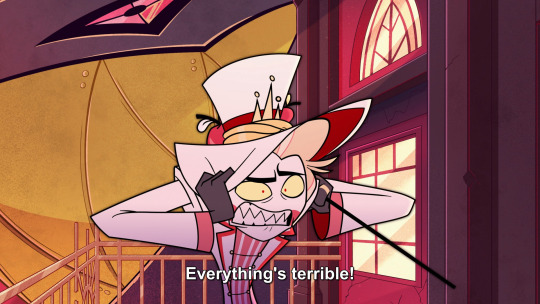
Based on the introduction to Episode 1, Charlie also views 'free will' as a gift (Miltonian), whereas Lucifer appears to view it as a curse.
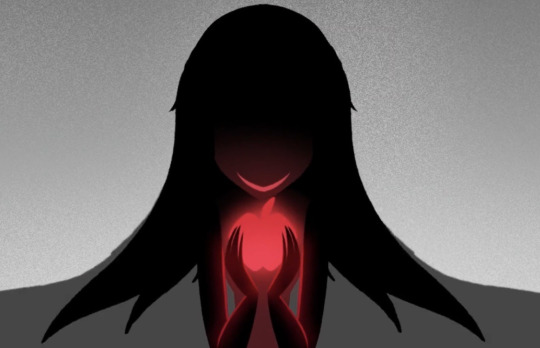
However, Charlie also notes that it was through the 'gift' of free will that the "root of all evil" entered the world, for if mankind could choose to be good, then they could also choose to be evil ('malus').
John Milton states in Paradise Lost: "Of Man's First Disobedience, and the Fruit Of that Forbidden Tree [malus], whose mortal taste Brought Death (evil, malus) into the World, and all our woe."
Thus, the use of an apple specifically is likely a tie-in to what others have been speculating about a character that series creator Vivienne Medrano (Vivziepop) alluded to a while back: "The Root of All Evil".
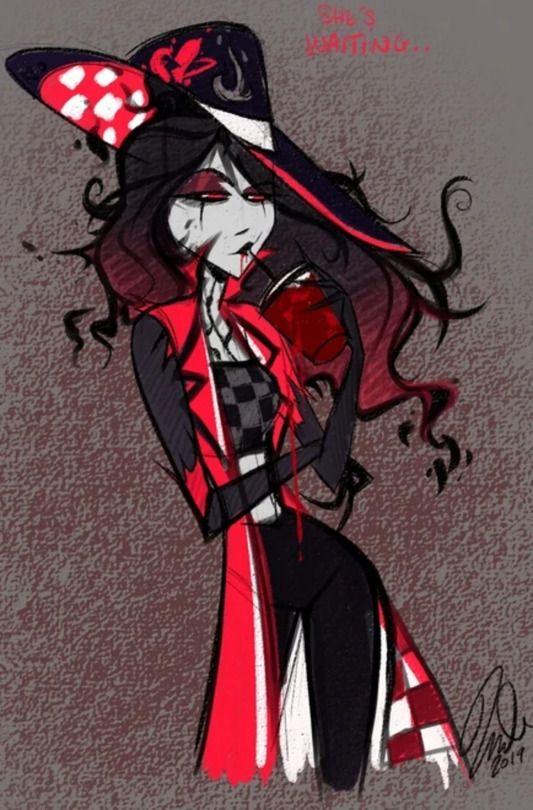
However, "Roo" itself is depicted as possessing the body of a human woman, presumably Eve, the first one to eat the "fruit of knowledge":
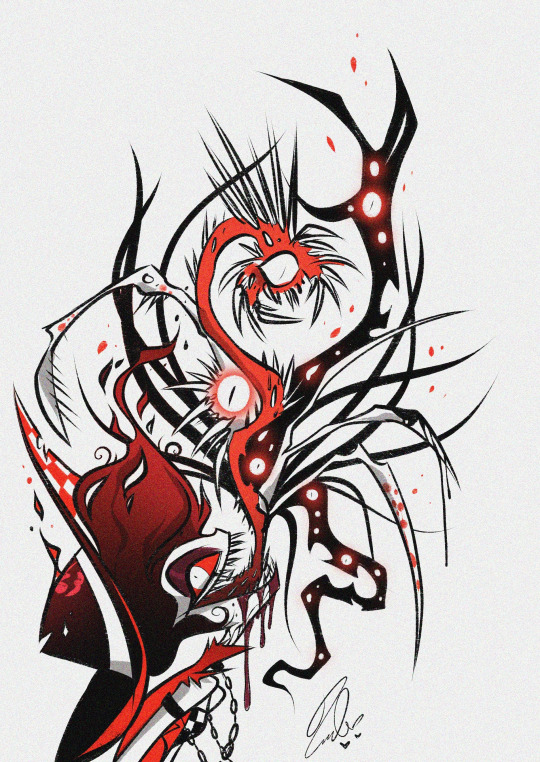
Thus, we can discern that "Malus" likely refers to this character. (Also see: "Maleficent", a name that also uses the root word "mal", "evil".) As for Roo's intentions, if Charlie is "good" - and, if, in fact, Alastor was sent by "Roo" (Eve) - then they may want for Alastor to work on their behalf to "corrupt" Charlie, or make sure the hotel never succeeds.
This is because demonic power is tied to human souls, and there are "millions of souls" in Hell, which likely fuels the great power of "Roo". The more souls there are in Hell, the more powerful "Roo" becomes. The Overlords also get their demonic power from "millions of souls".
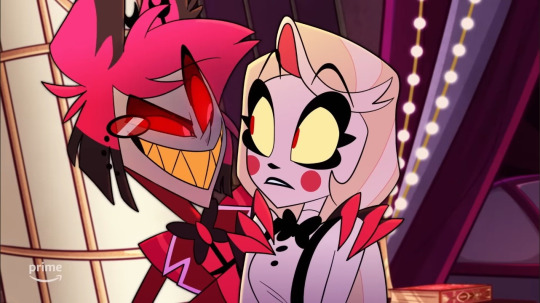
The deal between Eve and "Roo" might even be the first contract, or deal, between a human soul and a demonic entity; in exchange for 'free will', and the knowledge of good and evil, Eve allowed the "Root of All Evil" to inhabit her body, and to escape the void or prison it was confined to by Heaven (Hell?). (For one cannot be 'all-good' unless you attempt to 'eliminate' or 'ablate' evil; and, in Greek mythology, Zeus imprisoned the Titans in Tartarus for all of their evil deeds.)
Another possibility, brought up in an article by Gillian Osborne, is that Lucifer sees the "fruit of knowledge" as an apple, but it may appear as different fruits to different people, depending on how they view it. This also fits with Lucifer and angels being able to easily shapeshift.
In Paradise Lost, only Lucifer describes the fruit as an "apple" (malus), as he associates malus with "bad, evil", while the narrator also describes the fruit as "a mix of different colors" and peach-like. This then begs the question: "Did the fruit of knowledge of good and evil become 'evil' because Eve harbored resentment towards Adam?"
Quote: "Lucifer (Satan) gives Eve yet another hint that this tree may be more complicated than he wishes her to believe: although elsewhere in Milton's poem Eden is heady with its own newness, sprouting spring flowers left and right, the tree of knowledge is already old: its trunk is 'mossie'. Nevertheless, Lucifer claims to wind himself around the tree 'soon'; the quickness of his reported arrival stands in contrast to the timescales required to cover a fruit tree with moss (PL 9.589). Placing Lucifer's winding body between these two timescales—an easeful present and the inhuman scale of natural history—Milton suggests that there is something dangerous in entangling the past with the present. Yet, 'Paradise Lost' also makes deep biblical history feel like present politics for its readers. When Adam and Eve wander out of Eden at the end of the poem, they famously make their way not only into an earthly paradise, but also into the present. Eden's mossy apple tree therefore represents the pitfalls of conflating nature and history, of seeing any action in human history—even Eve's eating of an apple—as natural, if by nature, we mean inevitability. For Milton, history, unlike nature, is directed by humans, progressive, and, like the reading of 'Paradise Lost', hard work. While trees may inevitably collect moss the longer they live, Adam and Eve's labors in the garden, and our labors of reading, require agency and effort. Milton's poem refuses mourning the loss of Eden, [and the perfection of Heaven], in favor of a perpetual, melancholic, recreation of paradise: a present perfecting."
To quote Twisted: The Untold Story of a Royal Vizier, which also draws inspiration from John Milton's Paradise Lost: "It's an unfortunate situation...but you do have a choice [i.e. free will]."
#hazbin hotel#hazbin hotel analysis#hazbin#hazbin analysis#hazbin hotel meta#hazbin meta#hazbin hotel theory#hazbin theory#deep thoughts#john milton#paradise lost#eve hazbin hotel#lucifer hazbin hotel#lucifer morningstar#adam hazbin hotel#lilith hazbin hotel#lilith morningstar#roo hazbin hotel#root of all evil
252 notes
·
View notes
Text

Adam and Eve (16th century) by a Follower of Lucas Cranach the Elder (1472-1553), oil on panel, 146 x 95 cm, The Isabella Stewart Gardner Museum
#adam and eve#follower of lucas cranach the elder#lucas cranach the elder#painting#oil on panel#religious painting#fall of man#religious art#the garden of eden#isabella stewart gardner museum#boston#forbidden fruit#the apple#tree of knowledge#temptation#the serpent#my upload#art#fine art
24 notes
·
View notes
Text
In the time of Eden
Fanfic Comic Hazbin Hotel
Part 7
The fruit and forbidden love (Jesus what a cringe title)








I have no idea how Hazbin Hotel will approach the apple issue (I saw a lot of people theorizing that Roo was behind the apple's evil). So I ended up being inspired by some versions of religion, with the apple being knowledge, that Lucifer was jealous of humans... Anyway, just for fanfic to continue here ~
Part 8
#hazbin hotel#hazbin hotel fandom#hazbin#hazbin hotel fanart#artists on tumblr#hazbin hotel art#hazbin hotel lucifer#lilith morningstar#hazbin hotel comic#comic hazbin hotel#hazbin comic#hazbin fanfic#hazbin hotel fanfic#lucifer x lilith#lucifer hazbin hotel#lilith x lucifer#lucifer morningstar#hazbin lucifer#hazbin hotel lilith#lilith
219 notes
·
View notes
Text
ONE PIECE 1123
Dear lord I have so many thoughts I don't even know where to begin. This was a pretty short and lower stakes chapter compared to all the chaos and the bombs that came before it, but I think despite that, it gave me more revelations and thoughts than some of those ones did. It's all vague stuff like, it's soup in my brain but it just keeps getting more interesting.

Starting off with S-Snake continuously showcasing normal human behavior. I really like the insistence of the story of honing in that the Seraphim are, in fact, people. They are children. Their existence is horrific and it IS supposed to make you feel uneasy, especially comparing them to the rest of MADS' history of experiments. I do think, in a story about freedom, that these authority-chip-ridden-kids will eventually seek out their own freedom and independence to be people instead of weapons. Alber himself was a victim of MADS' experimentation, so was Kuma, Sanji, Mocha, every victim of the Smile fruits, hell- Bonney was a victim of the science of the Gorosei / Saturn. It's very interesting to continuously see Stella's role in all of this, and how Oda showcases that you could put the nicest guy alive into the same system as the most wretched monsters, and they will produce the same results. Which does bring me to this realization moving forward:


Sanji is in fact the person that was closest to the events of Vegapunk's death. He is specifically chosen out of all the strawhats to be the one to grapple with Vegapunks decision and sacrifice, and he is the only member of the strawhats to have experienced the horrors of MADS firsthand. I find that very interesting, it's looking at that dilemma of morality again. How do you judge a person who has spent years creating weapons of war, even if it's been the result of his naivete? How does a person who realizes what he has done, redeem himself? Death? Sacrifice? Admitting you can only throw your life away to undo the damage, to the face of someone who you know understands the horrors of such science? I don't know, it's interesting.

Going back a bit however, I think my favorite page in the chapter, is this. My god. Luffy thanking Emeth, full of joy, smile across his face in his Nika form, juxtaposed to the Iron Giant's dark unresponsive face. It's so moving and joyful and sad, genuinely. The brightness of the sun against the shadow of a sacrifice. Emeth in his "death" looks somehow both content and saddened. Luffy's recognition and gratitude towards him. OK. I'm fine. Damn.

Back to Vegapunk, this has been wild to see said textually when I've seen many people, myself included, discuss it. "Evil" and "Greed" being the two things Stella ended up leaving behind, despite his best efforts to do good. He recognizes greed was his downfall, his desire to continue building and discovering, without thinking about the consequences of it; just what we discussed earlier. It's also interesting that they all suspected Lilith at first, but she turned out not only to be innocent, but also a valuable ally in the battle and the only other survivor. Lilith leaving the garden, Stella being the forbidden apple (of knowledge) that brought about the downfall, the Gorosei being demonic entities that entered that space, it definitely is all very biblical. I wonder if Lilith will see a path towards becoming a more complete person, rather than, as Stella says here, a compartmentalized personification of "Evil". Similar to what I hoped for earlier with the Seraphim and Kuma (or even the Vinsmokes if you want to go there), a manifestation of full (rather than artificially partial or removed) personhood.

This is something I've been thinking about the entire time as well! Is Vegapunk really dead? Is it just his body? What does it mean to be able to keep your consciousness separate from said body? Within other people, even? Is he really dead as long Lilith and York are around? Is Stella himself, still in there, in Punk Records? Could you bring him back? Much to think about.

Aaaand closing in with my second favorite moment from this chapter. The confirmation we're going to Elbaf! Usopp being help up by the giants! His arc begins! I am so so giddy. I know I'm biased considering he's, well, my favorite One Piece character but, god. I am as nervous as hyped. I am so, so excited. This is delightful, he deserves this!
76 notes
·
View notes
Text
Hazbin Hotel Ep1 Rewrite
Okay, let’s get the shit I like first out of the way. Animation? Beautiful. Art style? Iconic. Music? Pops off.
Okay, now the fun part…
First let me just say, I adore biblical lore. So when I see something changed from the og lore, where I think the og was more interesting, I cannot let it go.
(I’m gonna focus on the Charlie storyline in the episode)
1. The Backstory
Let’s start with the first scene, the backstory of Lucifer and Lilith. In the show, they got some of the timeline and motivations wrong. I understand that the story is sugar coated, but hear me out.
“Once upon a time, there was a dazzling kingdom protected by golden gates, known as Heaven. Home to beings of pure light. Angels that worshiped good and lived in peace and harmony under the rule of God. The most beautiful of the Angels was Lucifer. He was a dreamer, with fantastical ideas for all creation. But he was restricted by God and the elders of Heaven, for they felt his way of thinking was dangerous to the order of their world.
Outraged by this injustice, Lucifer gathered an army of Angels, and declared war on the kingdom of Heaven. The battle raged on for centuries, but in the end, Heaven reigned victorious. As punishment for their betrayal, Lucifer and his army were cast out of Heaven. Banished to a crumbling wasteland, where the light of God could not reach. But Lucifer would not wallow in failure. From the barren landscape he rose a beautiful golden palace, crowned himself king and crafted a plan to share his freedom with God’s newest creation. Humanity.”
(I like to imagine that when Lucifer and his army fell, their wings burned up, leaving scattered feathers everywhere. In order to fly to Eden, Lucifer gathered these burned feathers and turned them into a new pair of wings for himself. They were black, messy, and trailed billowing smoke, but they could fly.)
Now for the Lilith part of the story. The more popular interpretation of her is that she is the first wife of Adam, but there is another version too, one where she is Adam’s second Wife after Eve. I personally prefer the latter because I can’t see anyone sinning or getting cast out of Edan before Eve eats the apple.
“He approached the garden of Edan in disguise, and offered the forbidden fruit of knowledge to the mother of humanity, Eve, who gladly accepted. But with the gift of knowledge and freedom, came a terrible curse. Evil bleed into the earth, and humanity was infected by darkness and sin.
For her disobedience Eve was cast out of Edan, to the dismay of her love, Adam. To appease him, the Angels crafted him a new bride, Lilith. Lilith was beautiful, with a voice so enchanting even Lucifer was mesmerized, but she was strong willed and refused to be subservient to her new husband. She fled from the garden, and rather than chase her, Adam found the tree of knowledge and bit into the forbidden fruit, so he could follow his true love, and be with her once more.
Lilith wandered, lost and alone, until she was found by Lucifer. Enamored by her beauty and iron will, he gave her his heart and made her his queen.”
Then you have the bit about Lucifer becoming depressed while Lilith thrived in Hell. I hate this! I was looking forward to a demonic Mortica and Gomez, not another Stolas and Stella. Plus, I’ve never been a fan of uwu sad misunderstood Lucifer. He is a complex character, but too often he’s over simplified by people who read Paradise Lost in high school and misinterpreted Lucifer as a tragic anti hero who was treated unfairly by the evil Angels. Lucifer can be tragic, even sympathetic. He can be fun and a caring father. But don’t forget that he is king of Hell. He is the prince of pride. He has an ego the size of east Texas and waged war against God himself.
And let’s not forget that in the show he is the head honcho over a strict cast system that encourages violence, allows the worst of the worst to take power, and leaves the hellborn races at the bottom at a severe disadvantage.
In this rewrite, Lucifer and Lilith essentially switch places, except Lilith isn’t a pathetic push over, she’s an incredibly famous rockstar, who’s always busy and not around often, but still has a bigger role in her daughter’s life than her husband, who’s been mia doing king shit.
And the last thing we hear about in the intro monologue is that the exterminations happens to prevent Hell from rising against them, which while that may be the case, don’t have Charlie say it!!! That realization for her would make the entire hotel superfluous! Charlie has to think that the problem truly is overpopulation.
2. Meeting with Adam
Let’s start with Adam himself. I hate this character. Especially as an adaptation of Adam. Yes, Adam is misogynistic. He expected Lilith to be subservient to him, but he wouldn’t be the frat boy type of misogynist, he’d be the old school chivalrous type. Grandpa style sexism. And shouldn’t the father of humanity care about his descendants? It doesn’t make any sense for him to be an executioner. He should be the leader of the guardian Angels or something.
In this rewrite, Adam is not the leader of the executioners, instead it’s the Angel Dumah. Dumah is the angel over the wicked dead, and he was appointed by God to torment sinners in Hell.
I want him to be an actual intimidating antagonist. He rarely speaks (his name means “silence”) and has many eyes (is described as having a thousand eyes)
As for the exorcists, they are Angels, but not actual dead humans wearing mask. They just look like that. Dumah is described as having tens of thousands of Angels of Destruction at his disposal. That’s what the exorcists are going to be, but instead of thousands, I’ll give him five. They don’t speak and are hardly sentient. They stand on top of the tower like gargoyles, until they “come to life” for the execution.
“But it’s a comedy! Shouldn’t they be funny?” No. It’s all about how characters react to them. The Litch in Adventure Time is a good example of this.
So obviously the meeting goes a lot differently.
Charlie gets a call, looks at the number, and excitedly tells everyone to, “shooooosh!” She takes the call nervously, saying, “yeah! Okay! Yes! Of course! I’ll be right there! Thank you SOOO much!!!” She hangs up and happily tells Vaggie that Dumah requested a meeting with her. Vaggie is nervous and says she should probably go with her, but Charlie says that she’ll be fine and tells her to stay and work on the commercial. She leaves excited that the Angels may finally be taking her seriously.
She makes it to the clock tower’s board room, where Dumah sits silently at the end of the table. Charlie nervously starts to greet him before she realizes they’re not alone. The Angels, Gabriel and Uriel have come from Heaven, for a meeting with Hell’s princess.
Uriel remains professional, politely bowing her head as she greeted Charlie. Gabriel on the other hand, threw his arms out, happily yelling, “Charlotte!!!” He wrapped her in an uncomfortably tight and awkward hug, saying how much she’s grown since he last saw her. He’s like a chill but estranged uncle meeting his now adult niece who he hasn’t seen since she was a baby and has no memory of him whatsoever.
Uriel watches the whole thing in embarrassment. She tells Charlie that Dumah had contacted them, regarding some, “interesting,” ideas about the extermination.
Charlie starts with her pitch, but Gabriel insists that they should take some time to catch up first. He claps his hands and summons plates of food for everyone. When we cut back to them, Gabriel is in the middle of telling the story about almost getting his ass kicked by Joseph when he told him his virgin wife was pregnant.
Uriel cuts him off, saying she doesn’t need to hear this story for the eighth millionth time. She turns to Charlie, exasperated, and tells her to get on with the pitch.
Charlie says that she has a potential solution for the over population problem in Hell. Uriel, Gabriel, and Dumah look at her blankly. Gabriel asks, “overpopulation?”
Charlie goes on to explain that she knows overpopulation is a big problem, but 275 sinners were executed this year alone and she just can’t stand to watch her people be slaughtered anymore.
Uriel asks if she’s suggesting an alternative, and Charlie very excitedly pitches her idea for the hotel. Uriel and Gabriel wear a matching “wtf” face and look back and forth at eachother like, “does this girl know what she’s suggesting?”
As Charlie is finishing, Uriel is visibly annoyed. She interrupts Charlie, complaining that this is ridiculous and has all been a massive waste of time as she stands up to leave. Charlie tries to stop her, saying, “please, you don’t understand.”
Uriel snaps back, “no, you don’t understand! They had their chance in life and they earned damnation.”
Charlie responds, “you're wrong. Sinners made mistakes, sure, but everyone makes mistakes.”
Uriel pinches the bridge of her nose (or where a nose would be on a person) “a mistake happens once. It’s an accident, an error in judgment due to naivety. Of course mistakes can be forgiven, but we’re not talking about mistakes, are we? These sinners had a choice, and they chose to live in sin.”
“A choice they now regret!” Charlie defends.
“It takes a lot more than regret to be forgiven.” Uriel says coldly. “It takes remorse.”
Gabriel chimes in, “she has a point, Charlie. It’s easy to make someone regret their actions, but to have them feel true selfless remorse, that is much more difficult.”
Charlie furrows her brow and starts to look defeated.
“But perhaps not impossible.”
Charlie beams with excitement. Gabriel explains that this is a big decision, too big to be made right now, but if she can successfully redeem one demon, they will allow her to come to heaven and pitch her idea to the entire Angelic court. Uriel tries to argue, but Gabriel just says they’ll discuss it later. Charlie gives him a tight hug before he and Uriel disappear.
As she turns to leave, Dumah puts his hand on her shoulder. This is the first time he’s moved in the entire scene. He stares at her coldly and says, “the only reason you’re here is your father has spared you from the executioner’s blade. If I had my way. Each and every one of you would be slaughtered.”
Charlie stares up at him. “I’ll keep that in mind.”
For context, part of the reason Gabriel and Uriel were initially confused by Charlie’s proposal is because they know that Lucifer is trying to keep Hell’s population as high as possible, in preparation for the second war with heaven. That’s why he and the other princes of hell work to manipulate humanity and temp them towards sin (i.e. succubi and incubi). That’s why he arranges marriages between powerful demons to make powerful demon children (i.e. Stolas and Stella). He needs as many demons possible for his army if he’s gonna have a chance at winning. So obviously, sending sinners to heaven, aka the opposing force, is the LAST thing Lucifer would want.
#Hazbin hotel#hazbin hotel critical#hazbin hotel rewrite#charlie morningstar#adam hazbin hotel#hazbin lucifer#hazbin lilith#lucifer morningstar#lilith hazbin hotel#vaggie hazbin hotel
307 notes
·
View notes
Text
🍎Fruit Correspondences🍎
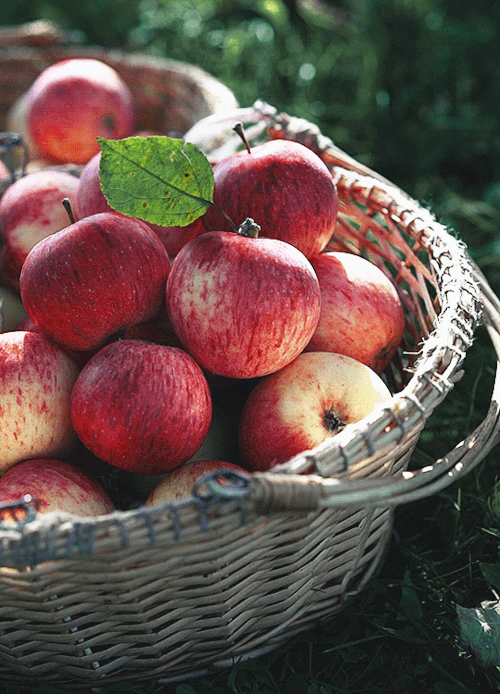
Apples:
Red Apples- Love, prosperity, lust, knowledge, sex, romance and passion, fruit of the dead, immortality, happiness, good physical health, curses
Green Apples- Money, prosperity, luck, success
Yellow Apples- Curses for money loss, greed, envy
Apricot- Love, longevity, good health, healing(physically and emotionally), sweetening things, glamour, beauty Banana- Travel, sex, fertility, potency, prosperity, comfort, pain relief, sleep, dreams; infidelity curses, impotence Blackberry- Healing, love, protection, natural beauty, lust, cursing, binding Blueberry- Healing, protection, calm, focus, communication Cantaloupe- Protection, energy, motivation Cherry- Dreams, love, divination, beauty, substitute for blood/meat/organs, happiness, emotional healing, friendship, repel negativity, relationships Coconut- Chastity, innocence, protection, purification, beauty Cranberry- Romance, cleansing, severing negative ties, ambition Date- Love, psychic abilities, friendships and repairing them, quick energy Elderberry- Protection (psychic and emotional attacks), protection from psychic vampirism, fidelity, spirit work, wisdom, cleansing, dexterity, balance (usually of body and mind), celebrations; can be used as a substitute for blood despite not being red, good for ink making Fig- Abundance, divination, energy, fertility, good luck, health, love, money, peace, power, strength
Grapes:
Green- Money and prosperity, business, grounding, creativity
Purple- Psychic abilities, divination, spirit work
Red- Strength, lust, fertility, encouragement
Grapefruit- Cleansing, confidence, cooperation, healing, inner strength, mental clarity, purification, curses
Honeydew Melon- Sweetness, refresh, renewal, energy, subtly, kindness, relationship Kiwi- Secrets, looking for answers, happiness, sex and physical longings, good luck Lemon- Love, purification, beauty, friendship, longevity, inspiration, cursing Lime- Command and dictation, emotional healing, protection, energizing, purification, protects from negativity, curses(envy, jealousy, money troubles, bond severing) Mango- Love, protection, harvest, business and legal matters, happiness, friendship and family Nectarine- Love Orange- Awareness, prosperity, love, friendship, divination, creativity, inspiration, dream work, opportunity, harvest, money luck Papaya- Love, protection, brings happiness, kindness, strength in hardship, overcoming challenges Peach- Happiness, love, protection, exorcism, wishes, femininity, female fertility, knowledge, motivation, bliss Pear- Love, lust, wealth Persimmon- Happiness, healing, luck, lust, sex, wisdom Pineapple- Relieves stress and anxiety, imagination, relieves art block, luck, prosperity, happiness Plum- Luxury, sex, lust, love, wealth, and sleep Pomegranate- Beauty, protection, lust, the forbidden, death, wisdom, blood substitute and organ substitute Raspberry- Fun, love, courage, blood substitute Strawberry- Love, curses(losing love, cheating or lost of sexual drive) Tangerine- Protection of a home or space, happiness, friendship and cheerfulness Watermelon- Purity, luck, happiness, renewal, rebirth
#wicca#wiccan#pagan wicca#wiccablr#pagan witch#witchcraft#witches#witch community#witchblr#witchery#witchy things#witch#digital grimoire#grimoire#pagan#paganblr#pagans of tumblr#paganism#witches of tumblr#magick
267 notes
·
View notes
Text
i may be insane (ignore me if i am) but its so poetic to me or maybe ironic that the vulcans, the TOUCH TELEPATH RACE who can SHARE MEMORIES, THOUGHTS, AND EMOTIONS through touch (...and potentially outside of that range, up for debate) and even SENSE certain emotions in a radius SUPPRESS them. like they are among The Ultimate Empaths, able to see and live through others' experiences to truly UNDERSTAND that individual, and be understood, understand WHY they think, feel, do as they do, and yet even with that, there was STILL violence and conflict (selfishness/individuality trumps all?). so, they turn to LOGIC, despite their EMPATHETIC NATURE (which is a whole other can of worms bc logic is also not the best to prevail/propagate and it also depends what logic u r using, which could lead to the same violent situation that Surak was trying to divert from. and, it IS logical to take into account emotions in certain contexts if you want to do the most Good which gets into philosophy what is Good, blah blah blah ANYWAYS) and yet when using their gift of telepathy, cannot help but FEEL through whoever they r melding to. its like forbidden fruit in the sense that if they let themselves feel at all or as openly as other species do (i.e. humans) it opens a pandora's box of possibilities of hurt and strife, to oneself and others, but it also allows connection and knowing and understanding, which, combined with logic, couldve made vulcans The Diplomats Ever, and peaceful asf. like i get that a utopia could never exist bc of differing opinions and theres ALWAYS bad apples but like. idk man. understanding. also "we vulcans do not feel emotions nyenyenye" is such an excuse and a false sense of security cuz like for one thing, spock is literally like... sorta discriminated against (but ig its "logical" bc vulcans have superior intellect/emotional regulation or wtvr and therefore spock is inferior but STILL, different faucets of skills and knowledge/usefulness) which is why he joins the 'fleet in the first place and not VSA. SECONDLY, they r also xenophobic which takes emotion, and in some fan (or other) interpretations, have corruption/nepotism n shit in governmental/VSA offices. thank u for listening to my mindless ramblings ☺️☺️
#star trek#vulcan#vulcans#spock#thoughts#star trek tos#star trek aos#sorry chat i am so insane#the ramblings of a madman#do you get my vision tho?#if this is smth already thought about before i am sorry#i love gay ppl <3
51 notes
·
View notes
Text
TSPUD: Symbolism of The Pink Room
@stelar-time asked in Twitter (I refuse to call it X) post about people's headcanons about the Pink Room and I thought I'd share this here, too
CW for some religious mentions

First, I'd like you to look at the dialogues in this part.

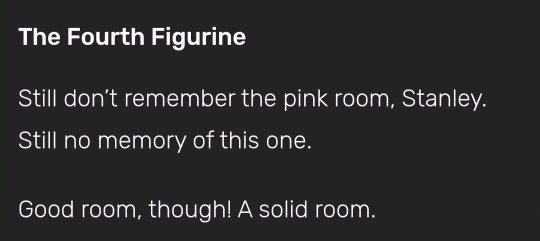
The fact that it's the fourth figurine is not a coincidence.
The Pink Room seems to serve as a symbol of nostalgia and of how memories can change with time. They tend to be rough and down the pipe you go, they do tend to lose details or get some added parts in, for your brain to make sense of them. That's why this room doesn't come at the first or last Figley and instead in the middle, as those are more often the parts we tend to forget.
What is interesting, though, is how Narrator questions it. Because a similar situation occurs somewhere else.
At the end of the Demo, Narrator starts to do a callbacks to the journey you had. However, at some point, he starts to mention and show parts you've never seen before. In contrast to the Pink Room though, there is not a single questioning involved. So, what's so special about that room?

You could say it's only a symbol of a nostalgia and fragility of memory. That he is recalling some moments he felt halky about and due to it, puts rose-tinted glasses which show off in a form of this room. Why hadn't he done the same thing in the Demo, though?
Memory overall seems to have a bigger role in TSPUD.
Narrator overall seems to have memory issues - he tends to remember some of the previous resets (skipping parts of the Freedom run after going through it nth time in a row) and completely forgets others.
That's why he has Memory Zone. He uses it as a photo album, not knowing it's as unreliable as his own callbacks.

But then, I did wonder... Why an apple? Why does this room show it and not anything else, any pink fruit?
And then, I looked at the architecture of the place and it reminded me of something.
Big window, a statue of some sort on a pedestal before it, pointed archs, to ribbed vaulting... It seems to match a typical church architecture. And then, it hit me.


The Apple of Eden. Fruit of the forbidden knowledge. Of somebody being there, someone watching, listening. Of him not having fun control over his creation might have been bit when we were jsut skipping around, only seeing part of his struggle in the Skip Button.

You might be then asking, why doesn't it have a bite mark then?
There are two possibilities I've considered:
1) it could shows Narrator's ignorance that he shows quite often. That could be true since he just tries to accept what had changed, trying to just say 'don't focus on it, it's a silly thing, let's move on'. He brings it up though since he already learnt from the Broom Closet that things untold seem to interest the Player more.
2) It's a memory within a memory. The apple before he bit in. It's the knowledge he beholds and shows us in a non direct way.
Just like the Bucket.
Nostalgia is supposed to give a good vibe but - it doesn't always succeed.
But this room can indirectly show Narrator's progress. The fact he knows more, the fact he can tell his memories get altered, the fact that - he changed.
In ways we misremember.
311 notes
·
View notes